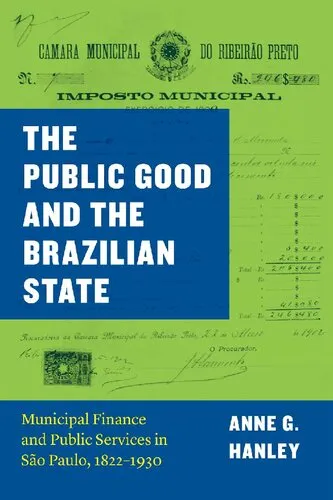The Public Good and the Brazilian State: Municipal Finance and Public Services in São Paulo, 1822–1930
4.5
بر اساس نظر کاربران

شما میتونید سوالاتتون در باره کتاب رو از هوش مصنوعیش بعد از ورود بپرسید
هر دانلود یا پرسش از هوش مصنوعی 2 امتیاز لازم دارد، برای بدست آوردن امتیاز رایگان، به صفحه ی راهنمای امتیازات سر بزنید و یک سری کار ارزشمند انجام بدینکتاب های مرتبط:
معرفی کتاب: The Public Good and the Brazilian State: Municipal Finance and Public Services in São Paulo, 1822–1930
کتاب «The Public Good and the Brazilian State» اثری گسترده و بینظیر درباره تاریخچه مالی و خدمات عمومی در شهر سائوپائولو است که از استقلال برزیل تا اوایل قرن بیستم را بررسی میکند. این کتاب به دنبال آشکار کردن نقش مالیات، بودجه شهری، و نحوه مدیریت خدمات عمومی در جهت ارتقای مفاهیم مدرن دولت و جامعه بومی برزیل است. تمرکز این اثر، تحلیل عمیق ارتباط میان منابع مالیاتی محلی، عملکرد شهرداریها و همچنین تأثیرات آنها بر توسعه اجتماعی و اقتصادی در این دوره زمانی است.
خلاصهای از کتاب
کتاب در چهارچوب تاریخی و اقتصادی نگاشته شده و چگونگی پدید آمدن ساختار مالی مدرن را در شهر سائوپائولو بررسی میکند. این اثر بیان میکند که چگونه سیستمهای مالی محلی و شیوههای اکثر شهرداریها باعث ظهور زیرساختهای جدید شهری نظیر آبرسانی، گاز، برق، مدارس و حمل و نقل عمومی در دوران پایانی قرن نوزدهم و اوایل قرن بیستم شدند.
تمرکز بر موضوعات مالی شهرداری، رابطه بین مالیاتهای محلی و نحوه فراهم آوردن کالاهای عمومی بررسی میشود و نویسنده با استفاده از اسناد بایگانی، گزارشها و دادههای مالی متنوع منابع غنی و قابل استنادی را در کتاب گنجانده است.
نکات برجسته
- تحلیل عمیق نقش مالیات و سیستمهای درآمدی محلی در توسعه شهری.
- بررسی تأثیرات سیاستگذاری شهری بر توسعه اقتصادی و اجتماعی.
- ارائه رابطه بین خدمات عمومی و نهادهای مدرن شهرداری در بستر تاریخنگاری برزیل.
- پشتیبانی از تحلیلها توسط دادههای موثق آرشیوی و تحقیقات میدانی.
نقلقولهای مشهور از کتاب
"The intersection of public finance and urban transformation in São Paulo reveals the critical role of municipal agencies in molding both economic and social landscapes."
"The fiscal innovations that emerged during this period were not merely technical but fundamentally reshaped the relationship between citizens and the state."
چرا این کتاب اهمیت دارد؟
کتاب «The Public Good and the Brazilian State» یک منبع ارزشمند برای محققان تاریخ، اقتصاد، مطالعات سیاست عمومی و همچنین کسانی است که علاقهمند به توسعه شهری و مدیریت مالی هستند. این اثر به طور خاص برای درک تحولات مالیاتی و خدمات عمومی در کشورهای آمریکای لاتین منبعی ضروری تلقی میشود و بسیاری از سیاستهای شهری و مفاهیم مدرن اقتصادی و اجتماعی از آن الهام گرفتهاند. همچنین نویسنده با ارائه دیدگاههای تاریخی جامع و تحلیل دقیق نشان میدهد که چگونه تأمین منابع مالی عمومی، به ویژه در سطح محلی، میتواند چالشهای توسعه پایدار را در زمانهای مختلف مدیریت کند.
Introduction
"The Public Good and the Brazilian State: Municipal Finance and Public Services in São Paulo, 1822–1930" is an in-depth exploration of how the Brazilian state, particularly in São Paulo, transitioned through a transformative period during the 19th and early 20th centuries. This book examines the dynamic and often complex relationship between local governance, public finance, and the emergence of public services in one of Brazil's most important cities during a critical era in its development.
By delving into archival records, economic data, and government documents, the work provides a comprehensive analysis of how São Paulo's municipal administration tackled challenges related to public health, infrastructure, and social welfare in a rapidly growing urban environment. It also explores broader themes of modernization, state capacity, and the evolving concept of the “public good” in a society marked by vast economic inequalities and political changes. This introduction seeks to offer an overview of the book's key themes, structure, and the significance of its contribution to studies of Brazilian history and urban development.
Detailed Summary of the Book
"The Public Good and the Brazilian State" is meticulously organized to trace the evolution of public finance and services in São Paulo from Brazil’s independence in 1822 to the early days of industrialization in the 20th century. The book is divided into thematic sections that analyze periods of fiscal experimentation, economic growth, and administrative change. It provides a historical narrative that situates São Paulo’s development within the broader context of Brazil's transition from a monarchy to a republic, highlighting the interplay between local and national governance structures.
One of the book's core arguments rests on the premise that financial autonomy at the municipal level was critical for addressing urban needs and fostering economic progress. São Paulo, as the economic engine of Brazil, was a particularly illuminating case study, given its demographic explosion and the rapidity of its infrastructure development. The book dives deep into the mechanisms by which municipal governments funded public works, including taxation, loans, and other innovative financial instruments. Additionally, it examines how municipal investments in areas such as sanitation, transportation, and public education impacted both the quality of urban life and the social fabric of the city.
The study does not shy away from addressing the social inequalities that shaped the practical outcomes of municipal policies. While São Paulo's elite often benefited disproportionately from public expenditures, the book charts the gradual broadening of public services to include marginalized groups, a process often driven by grassroots activism and changing political ideologies. Hence, the work underscores how public finance was both a tool of governance and a reflection of the shifting priorities of São Paulo's society.
Key Takeaways
- The concept of the “public good” evolved in São Paulo as urbanization and modernization demanded new approaches to governance and public finance.
- São Paulo's municipal administration played a pioneering role in experimenting with financial instruments to fund public services such as sanitation, transportation, and education.
- The relationship between local and national governance was a critical factor in the development of municipal institutions in the 19th and early 20th centuries.
- This historical study provides key insights into the foundational challenges of urban development and inequality in Latin America.
- Economic growth in São Paulo during this period was deeply intertwined with advancements in public administration and infrastructure development.
Famous Quotes from the Book
"The public good is not a fixed or universal ideal but a reflection of society’s collective priorities at any given time—a balancing act between governance, economy, and social justice."
"Investments in public infrastructure did more than build roads and sewage systems; they laid the foundation for a shared civic identity and an evolving sense of citizenship."
Why This Book Matters
This book offers vital academic and practical insights into the historical development of municipal governance and urban infrastructure in Brazil. São Paulo's growth as a metropolis during the 19th and early 20th centuries was not merely the result of economic opportunity but was deeply shaped by decisions made at the municipal level to invest in public services. By exploring these decisions in depth, the book enhances our understanding of how public administration interacted with broader socioeconomic forces to carve pathways toward modernization.
For researchers, policymakers, and students of urban history and development, "The Public Good and the Brazilian State" is an indispensable resource. It reveals how historical experiences can offer valuable lessons for addressing contemporary challenges such as urban inequality, infrastructure deficits, and public health crises. Furthermore, it situates São Paulo within a global context, illustrating how its developmental trajectory relates to similar instances of state formation and urbanization worldwide.
دانلود رایگان مستقیم
شما میتونید سوالاتتون در باره کتاب رو از هوش مصنوعیش بعد از ورود بپرسید
دسترسی به کتابها از طریق پلتفرمهای قانونی و کتابخانههای عمومی نه تنها از حقوق نویسندگان و ناشران حمایت میکند، بلکه به پایداری فرهنگ کتابخوانی نیز کمک میرساند. پیش از دانلود، لحظهای به بررسی این گزینهها فکر کنید.
این کتاب رو در پلتفرم های دیگه ببینید
WorldCat به شما کمک میکنه تا کتاب ها رو در کتابخانه های سراسر دنیا پیدا کنید
امتیازها، نظرات تخصصی و صحبت ها درباره کتاب را در Goodreads ببینید
کتابهای کمیاب یا دست دوم را در AbeBooks پیدا کنید و بخرید
1184
بازدید4.5
امتیاز0
نظر98%
رضایتنظرات:
4.5
بر اساس 0 نظر کاربران
Questions & Answers
Ask questions about this book or help others by answering
No questions yet. Be the first to ask!














